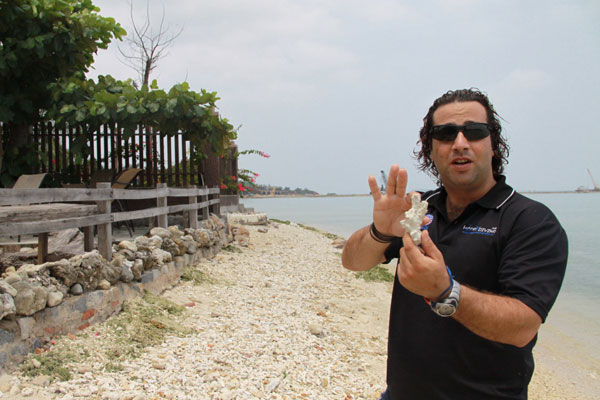Sanya divers' passion and concern for underwater world
|
At the beach close to China Dive Resort, Hamza Marie shows a broken coral. [Photo:CRIENGLISH.com/Duan Xuelian] |
In the eyes of Hamza Marie, a Jordanian diving devotee and experienced diving instructor who has explored the seas of fourteen countries, Sanya is the only place that has tied him down for so long. And yet, he seems to be constantly torn between his love of the city's underwater world and immense sadness whenever he sees a piece of broken coral or a dead fish washed ashore.
"This is what we stay under the water more than three hours to look for. These are corals; this is the coral that I am talking about. They grow many years to this size -- this, this one, is the same."
Some ten minutes' walk from the China Dive Club resort where Marie teaches diving, pale dead corals piled the edge of an enclosed beach like heaps of white bones.
According to an investigative report by Chinanews.com in February 2010, one out of four tourists in Sanya will go diving during their stay. But, there are only 13 licensed diving operation agencies. Large numbers of tourists are going underwater without proper guidance; as a result, enormous amounts of coral are destroyed out of human negligence.
"Every place in the world that is famous for diving and sea life, you will find they have a protected area from fishing people and from people who damage the corals. "
One hand cannot clap. Marie used this metaphor to call for efforts on the government side. "If the beaches within Sanya are satisfactorily preserved, we won't need to take one hour's drive and a boat journey to find clear waters to dive," he explained.
To Liu Bing, the most prestigious diving instructor at China Dive Club and friend of Marie, deep down under the water is an entirely different world. "And you have to care about diving very much to prevent this exclusive world from being tainted."
"I don't feel very proud when I find out Sanya is not in the list of world's top 100 diving destinations," says Liu Bing, one of only six diving course directors trained and recognized by Professional Association of Diving Instructors (PADI) in China.
As a registered member of Chinese Underwater Association and a five-star training center and diving resort under PADI, China Dive Club inherited the responsibility of promoting awareness about the aquatic world through Project Aware, in which divers observe the health conditions of corals by recording their colors and making comparisons.
"For example, the more vivid the color, the more healthy the coral. Then you can compare the coral colors with the record from last year in the same water area. If the color is faded, then probably the health of these corals is deteriorating."
Since PADI, the world's leading organization for training divers, was introduced to China in 2004, the nation's diving industry has undergone a dramatic boom. By 2009, the total number of people who have tried diving and are diving professionally has increased tenfold.
"What the China Dive Club is trying to do," Liu said, "is to provide a venue for diving fans to meet and communicate." Although we offer one-time escort diving service, I still hope more people can fall in love with this sport.
With the central policy of building Hainan into an International Tourism Island in full swing, a series of new regulations have been introduced.
Huang Peng, Manager of the China Dive Club, said the regulations are helpful in leading the diving industry in Sanya onto a more orderly development path.
"Establishing Hainan as an international tourism island is beneficial to all of us, especially for those of us who are in the diving business. I also learned from various sources that the diving industry is one of key projects on the government's agenda. "
"The authentic way to get to know the ocean is diving," said Huang, one of China's earliest to bring diving into public knowledge.
He also suggests that, in terms of upping the ante of diving services, the regulations should be formulated in accordance with international standards.
"Another thing is how to implement the international practices. For example, about the designated place for diving-- should they be only open to certain diving companies or open to all certified companies? We expect to see some changes in this respect."
The China Dive Club has recently changed its name to the China Ocean Sports Union. Liu Bing, the diving instructor, revealed that they plan to include other water sports like surfing and yachting into their business range. "But passion for diving is the ultimate thing that binds us together," he added.
Now with 5% of its diving instructors being from abroad, and all the others receiving regular English language training, the club attracts students from China and abroad.
Li Kai, a student, joined the China Dive Club one month ago and is fitting in quite well. Now, he's considering pursuing diving as his future career. Like his instructors, he is also fascinated by the soothing effect of the underwater world.
"I can rid all thoughts from my mind and simply be relaxed. The sea life surrounding me makes me totally at ease."
The elementary level of diving lessons, called the "Open Water Level," is usually conducted in swimming pools. It takes three to five days and around three thousand yuan to finish the course.
The company has just welcomed two students from Beijing who are receiving their first lesson on diving.
"But before we teach students how to dive," Hamza Marie and all the instructors at the club agree, "we teach them how to avoid damaging the underwater life."
 0
0 








Go to Forum >>0 Comments